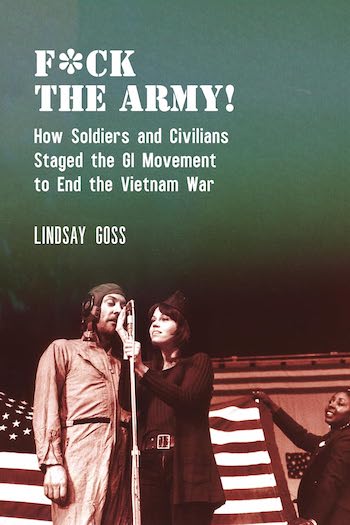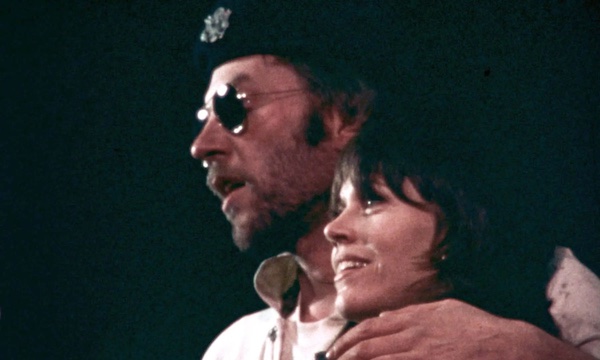Book Review: “F*CK The Army” — Anti-War Entertainment
By Bill Littlefield
The revolving cast members of the FTA road show were determined to reinforce the belief among members of the military that the Vietnam War was at best pointless and at worst criminally insane as well as murderous.
F*CK The Army: How Soldiers and Civilians Staged the GI Movement to End the Vietnam War by Lindsay Goss. New York University Press, 240 pages. Hardcover, $89, paperback, $30.
 Officially, the letters FTA stood for Free Theater Associates. The organization’s collection of traveling entertainers included Peter Boyle, the late Donald Sutherland, and Jane Fonda, among others. Unofficially, the participants, the audience, and everybody else familiar with the group and its skits and musical numbers knew what the initials really stood for — “Fuck the Army.”
Officially, the letters FTA stood for Free Theater Associates. The organization’s collection of traveling entertainers included Peter Boyle, the late Donald Sutherland, and Jane Fonda, among others. Unofficially, the participants, the audience, and everybody else familiar with the group and its skits and musical numbers knew what the initials really stood for — “Fuck the Army.”
Reading about the performances of the Free Theater Associates, now over 50 years ago, brought back a memory from those days of escalation in the war against Vietnam. I was told that anybody who sported an FTA tattoo at the induction physical wouldn’t be drafted. I have no idea whether that was true.
As author, “theater maker, cultural historian, and performance theorist” Lindsay Goss reports, “at first glance, the FTA appears to reinforce a persistent perception of the antiwar movement during Vietnam as ‘anti-soldier,’” but “the show was an act of solidarity — a civilian-led effort to support the growing number of service members who were fed up with the war and, increasingly, inclined toward organizing against it from within the military’s ranks.” Sutherland, Fonda, and the revolving cast members of the FTA road show were determined to reinforce the belief among members of the military that the war was at best pointless and at worst criminally insane as well as murderous.
One of the anecdotes Goss includes in her history demonstrates the connection some of the troops felt to what FTA was trying to do. A Washington Post reporter in Vietnam was approached by a young soldier with a horrific photograph of a Vietnamese woman who had been murdered and mutilated. “I’ve seen a lot worse than this,” the soldier tells the reporter. “They told me this woman was just running across a field. You think I should show this to Jane? I think she should see it, she’s a woman, she should know about this.”
In another revealing passage, we learn that, unlike previous entertainers sent to the front for propaganda value, Fonda had significant contact with the other side. Goss describes an incident that found the actress huddled in a ditch with her Vietnamese guide and a local schoolgirl while US planes dropped bombs around them. When the raid was over and the three women emerged from their hole, Fonda found herself saying, over and over, “I’m so sorry, oh, I am so sorry, I’m so sorry.” The guide stopped her, calmly, and translated the school girl’s reply: “You shouldn’t cry for us. We know why we are fighting. The sadness should be for your country, your soldiers. They don’t know why they are fighting us.”

The late Donald Sutherland and Jane Fonda in the 1972 agitprop documentary F.T.A. Photo: Kino Lorber
According to Goss, on their headiest days, the members of FTA believed that their antiwar efforts were making a significant difference. It may have been true. For whatever combination of reasons, the number of soldiers and sailors who opposed the bloody work they’d been brought to Vietnam to do were increasing. Protests within the ranks grew and became more vocal. On some occasions soldiers sabotaged their own missions, even shooting or threatening to shoot the officers who gave them orders that the soldiers concluded were ill-considered or unreasonably dangerous. The act of rebellion was called “fragging,” after the fragmentation grenades the soldiers carried. Suicides within the military were not uncommon, and desertions increased. “A 1972 study found that ‘volunteer soldiers were more prone to go AWOL than draftees.’”
The subject matter of F*CK The Army guarantees that the book includes substantial drama. Unfortunately, Goss’s style is sometimes curiously flat. She writes like a scholar who has an audience of fellow scholars in mind. Some readers won’t be open to the message because they will find the volume pedantic, and that is unfortunate, since the more who learn about endeavors like FTA, the more likely America will avoid another mad military rampage.
Bill Littlefield’s most recent novel is Mercy (Black Rose Writing).

This review is a bit frustrating because it’s missing the obvious: what did the FTA troupe do on stage? How did it come together? Who were the participants? When did it break up and why? You know, the FACTS.
You have a good point — all that info is in Peg Aloi’s Fuse review of a documentary chronicling the F.T.A.’s tour of army bases in the ’70s (for some reason the film refers to the group as F.T.A. while Goss’s book has it as FTA).
From the review:
“This new 4K restoration from IndieCollect gives contemporary audiences a long-awaited opportunity to see footage of a traveling anti-war show performed at military bases in 1971 during the height of the Vietnam conflict. Exuding a guerilla theater, agitprop vibe (with touches here and there of vaudeville and live sketch comedy), F.T.A. is a thrilling expression of pacifism and accountability directed at the military. Directed by Francine Parker, this documentary was released in 1972, soon after Jane Fonda’s controversial visit to Hanoi, which earned her the derogatory moniker “Hanoi Jane.” It made her a target of establishment types who accused the actress of exploiting the war for the sake of fame. The ruckus swirling around Fonda no doubt undercut the film’s release, and it may explain why Parker’s incendiary but uplifting chronicle, filmed soon after journalistic revelations about the 1968 Mai-Lai Massacre, has been little seen since. Until now, thanks to Kino Lorber and IndieCollect for making this counterculture gem available through virtual cinemas on KinoMarquee.com.”
“The performers include Fonda, Donald Sutherland, Len Chandler, Pamela Donegan, Peter Boyle, Holly Near, Rita Martinson, and other assorted actors and musicians. (Fonda and Sutherland starred in Klute that same year.)”